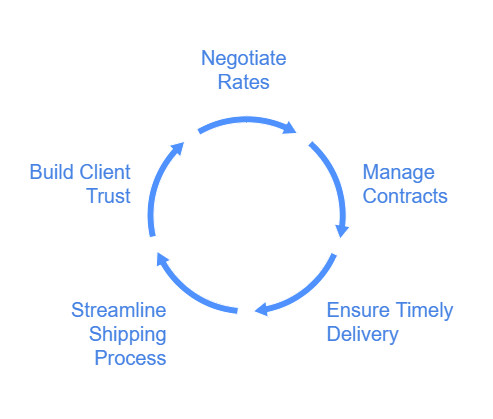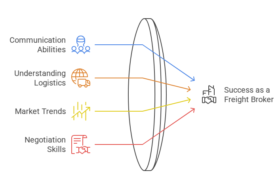Table of Contents
- Introduction
- What is a Certified Freight Broker?
- Why Certification Matters
- Key Steps to Certification
- Benefits of Becoming Certified
- How to Choose the Right Training Program
- Conclusion
Introduction
The logistics and freight industry is a cornerstone of global commerce, and becoming a certified freight broker can open doors to a lucrative and fulfilling career. Certification not only boosts your credibility but also equips you with the essential knowledge and skills to succeed in this competitive field. Whether you’re a newcomer or looking to advance your career, achieving certification is a strategic move.
A certified freight broker acts as the critical link between shippers and carriers, ensuring goods are transported efficiently and cost-effectively. Earning your certification is not just about meeting industry standards—it’s about setting yourself apart as a knowledgeable and capable professional. Certification provides the tools, credibility, and competitive edge needed to excel in this fast-paced industry.
If you’re ready to embark on a fulfilling career path, now is the perfect time to start your journey and achieve lasting success.
What is a Certified Freight Broker?
A certified freight broker is a professional who has completed specialized training and obtained credentials to demonstrate their expertise in freight brokerage. This certification validates your ability to connect shippers and carriers, manage logistics, and comply with industry regulations.
Why Certification Matters
Credibility: Certification enhances your reputation and assures clients of your professionalism.
Compliance: Learn and adhere to federal and state regulations, including FMCSA requirements.
Competitive Edge: Stand out in a crowded market by showcasing your expertise.
Key Steps to Certification
- Meet Basic Requirements: Be at least 18 years old and have a high school diploma or equivalent.
- }Choose a Training Program: Enroll in a reputable course, such as those offered by Freight Brokers Course.
- Obtain a Freight Broker License: Apply for a Motor Carrier Operating Authority through the FMCSA.
- Secure a Surety Bond: Fulfill the $75,000 bond requirement to operate legally.
- Get Insurance Coverage: Protect your business with liability and cargo insurance.
- Pass Certification Exams: Complete the training program and any required exams.
- Network and Gain Experience: Build connections in the industry to grow your client base.
Benefits of Becoming Certified
- Higher Earnings Potential: Certified brokers often command better rates.
- Expanded Opportunities: Work with larger shippers and carriers.
- Skill Development: Gain advanced knowledge in logistics, negotiation, and problem-solving.
How to Choose the Right Training Program:
Selecting the right program is crucial for your success. Look for:
- Comprehensive curriculum covering industry regulations, operations, and marketing.
- Experienced instructors with real-world knowledge.
- Positive reviews and a proven track record of success.
- For trusted certification programs, check out Freight Brokers Course.
Conclusion
Becoming a certified freight broker is a smart investment in your future. Certification equips you with the skills, knowledge, and credentials needed to excel in the logistics industry. By following the steps outlined above, you can start your journey to a successful freight brokerage career.
Whether you’re new to the field or looking to advance, achieving certification can set you apart from the competition and open doors to exciting opportunities. Begin by enrolling in a reputable training program, building your expertise, and establishing your presence in the industry. For the best resources and training, visit Freight Brokers Course and take the first step toward becoming a certified professional in freight brokerage.
Growth + Change = Opportunity! How are you going to capitalize on the opportunity as a freight broker, agent, dispatcher or box truck carrier?
Enroll in a course today and get a Shippers List for free! Use Code: freeship









